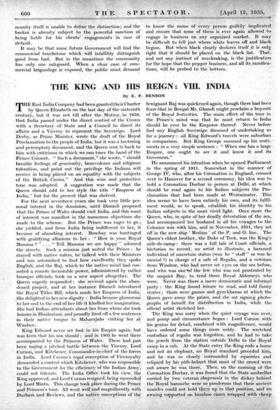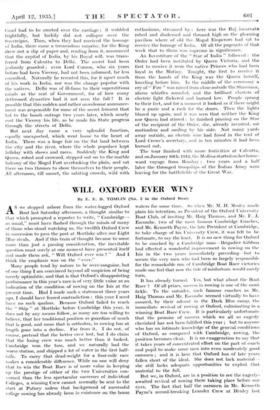THE KING AND HIS REIGN : VIII. INDIA
• By E. F. BENSON
rEEast India Company had-been granted their Charter by Queen Elizabeth on the last day of the sixteenth 'century, but it was not till after the Mutiny, in 1858, that India passed under the direct control of the Crown with a Secretary of State and a Council to direct its affairs and a Viceroy to represent the Sovereign. Lord Derby, as Prime Minister, wrote the draft of the Royal Proclamation to the people of India, but it was a hectoring and peremptory document, and the Queen sent it back to him with criticisms in which we. can trace the hand of the Prince Consort. " Such a document," she-wrote, " should breathe feelings of generosity, benevolence and religious toleration, and point out the privilege the Indians will receive in being placed on an equality with the subjects of the British Crown." And this wise and protective tone was adopted. A suggestion was made that the Queen should add to her style the title " Empress of India," but for the present that was shelved.
For the next seventeen years she took very little per- sonal interest in the dominion, until Disraeli proposed that the Prince of Wales should visit India, and this want of interest was manifest in the numerous objections she made to the scheme. But the Prince was eager to go ; she yielded, and from India being indifferent to her, it became of absorbing interest. Bombay was buntinged with gratifying allusions to her : " How is your Royal Mamma ? " . . . " Tell Mamma we are happy " adorned the' streets. Such a mission just suited the Prince : he stayed with native rulers, he talked with their MinisterS' and was astonished, to find how excellently they spoke English, and -the Raj, which to the native mind had con." noted a remote inexorable power, administered by rather brusque officials, took on a new aspect altogether. The Queen eagerly responded : she revived again the aban- doned project, and at her instance Disraeli introduced the Royal Titles Bill, which made her Empress of India. -She delighted in her pew dignity : India became glamorou to her and to the end of her life-it kindled her imagination She had Indian attendants about her from whom she took lessons in Hindustani, and proudly fired off a few sentences in their native tongue to Maharajahs visiting her at Windsor.
King Edward never set foot in his Empire again, but was keen that his son should ; and in 1905 he went there accompanied by the Princess of Wales. There had just been raging a pitched battle between the Viceroy, Lord Curzon, and Kitchener, Comniander-in.:chief of the forces in India: Lord Curzon's regal conception' of Viceroyalty demanded a control which Kitchener, who was responsible, to the GoVernment for the efficiency of the Indian Army;: could not tolerate. The India Office took his view, the King approved, and Lord Curzon resigned, being succeeded by Lord Minto. This change took place during the Prince and PrinceSs's tour. All went welr and magnificently with Durbars and Reviews, and the native conceptions of the benignant Raj was quickened again, though there had been fears that in Bengal Mr. Ghandi might proclaim a boycott of the Royal festivities. The main effect of the tour in the Prince's mind was that he must return- to India should he ever be the Emperor thereof. Never before had any English Sovereign dreamed of undertaking so far a journey all King Edward's travels were suburban in comparison. But King George summed up his senti- ments in a very simple sentence : " When one has a large• Empire, one ought to see it and know it and its Governors."
He announced his intention when he opened Parliament in the spring of 1911. Somewhat in the manner of George IV, who, after his Coronation in England, crossed over to Hanover for a second ceremony, his idea was to hold a Coronation Durbar in person at Delhi, at which should be read again to his Indian subjects the Pro- clamation that had been made at Westminster. This idea seems to have been entirely his own, and its fulfil- ment would, so to speak, establish his identity to his Indian subjects in the most vivid light. Once more the Queen, who, in spite of her deadly detestation of the sea, had accompanied her husband in all his voyages to the Colonies was with him, and in November, 1911, they set off in the new ship ' Medina ' of the P. and O. line. The Queen's eldest brother , the Duke of Teck, was the King's aide-de-camp : there was a full tale of Court officials, a historian to record, an artist to illustrate, a harassed individual of uncertain status (was he " staff " or was he menial ?) in charge of a safe of Regalia, and a cowman from Windsor, who had never set eyes on the sea before, and who was one bf the few who was not prostrated by the unquiet Bay, to tend three Royal Alderneys who were. NeVer was there a more democratic and informal party : the King found leisure to read, and told funny stories ; there were games and gym khans at which the Queen gave away the prizes, and she sat signing_photo- graphs of herself for distribution in India, while the official artist sketched her.
The King was sorry when the quiet voyage was over, and pomp and circumstance began : Lord Curzon with his genius • for detail, combined with magnificence, would have ordered some things more nobly. The wretched custodian of regalia was forgotten, and he had to take the jewels fforn the station outside 'Delhi to the Royal camp 'in a cab: At the State entry the King rode a horse and not an elephant, no Royal standard preceded him, and he was so closely surrounded by equerries and eclipied by his pith-helmet that most of the crowd were not aware he was there. Then, on the morning of the Coronation Durbar, it was found that the State umbrellas carried by two veteran chuprassis in the dickey behind the Royal barouche were so ponderous that their ancient muscles could not hold them up in that position, and an awning supported on bamboo canes wrapped with cheap tinsel had to be erected over the carriage ; it wobbled frightfully, but luckily did not collapse over the Sovereigns. Then, when they had received the homage of India, there came a tremendous surprise, for the King drew out a slip of paper and, reading from it, announced that the capital of India, by his Royal will, was trans- ferred frOni Calcutta to Delhi. The secret had been jealously guarded ; even Lord Curzon, who six years before had been Viceroy, had not been informed, far less consulted. Naturally he resented this, for it upset much of his work in India, nor was the change popular with the natives. Delhi was of ill-fame to their superstitious minds as the seat of Government, for of how many. dethroned dynasties had it not seen the fall ? It is possible that this sudden and rather unwelcome announce- ment was responsible for some .of the secret ferment that led to the bomb outrage two years later, which nearly cost the Viceroy his life, as he made his State progress through the streets of Delhi.
But next day came a very splendid function, equally unexpected, which went home to the heart of India. There was a huge fair on the flat land between the city and the river, where- the whole populace kept hdliday with shows and races. Suddenly the King and Queen, robed and crowned, stepped out on to the marble balcony of the Mogul Fort overlooking the plain, and sat there on two thrones to show themselves to their people. All afternoon, till sunset, the saluting crowds, wild with enthusiasm, streamed by : here was the Raj incarnate robed and diademed and throned high on the gleaming pavilion where of old the Mogul Emperors had sat to receive the homage of India. Of all the pageants of that week that to them was supreme in significance.
An Investiture of the " Star of India " followed : the Order had been instituted by Queen Victoria, and the first to receive it were the native Princes who had been loyal in the Mutiny. Tonight, the first to receive it from the hands of the King was the Queen herself, kneeling before him. In the middle of the ceremony a cry of " Fire " was raised from close outside the Shamiana, alarm whistles sounded, and the brilliant dusters of electric light flickered and burned low. People sprang to their feet, and for a moment it looked as if there might be a panic and a rush for the doors. Then the lights blazed up again, and it was seen that neither the King nor Queen had stirred : he finished pinning on the Star of the recipient of the Order, she, already invested, sat motionless and smiling by his side. Not many yards away outside, an electric wire had fused in the tent of Lord Crewe's secretary, and in ten minutes it had been burned out.
The tour finished with more festivities at Calcutta, and on January 10th, 1912, the Medina started on her home- ward voyage from Bombay : two years and a half later the thronged troopships of the Indian Army were leaving for the battlefields of the Great War.



















































 Previous page
Previous page